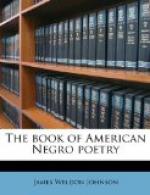The constant effort in Negro dialect is to elide all troublesome consonants and sounds. This negative effort may be after all only positive laziness of the vocal organs, but the result is a softening and smoothing which makes Negro dialect so delightfully easy for singers.
Daniel Webster Davis wrote dialect poetry at the time when Dunbar was writing. He gained great popularity, but it did not spread beyond his own race. Davis had unctuous humor, but he was crude. For illustration, note the vast stretch between his “Hog Meat” and Dunbar’s “When de Co’n Pone’s Hot,” both of them poems on the traditional ecstasy of the Negro in contemplation of “good things” to eat.
It is regrettable that two of the most gifted writers included were cut off so early in life. R. C. Jamison and Joseph S. Cotter, Jr., died several years ago, both of them in their youth. Jamison was barely thirty at the time of his death, but among his poems there is one, at least, which stamps him as a poet of superior talent and lofty inspiration. “The Negro Soldiers” is a poem with the race problem as its theme, yet it transcends the limits of race and rises to a spiritual height that makes it one of the noblest poems of the Great War. Cotter died a mere boy of twenty, and the latter part of that brief period he passed in an invalid state. Some months before his death he published a thin volume of verses which were for the most part written on a sick bed. In this little volume Cotter showed fine poetic sense and a free and bold mastery over his material. A reading of Cotter’s poems is certain to induce that mood in which one will regretfully speculate on what the young poet might have accomplished had he not been cut off so soon.
As intimated above, my original idea for this book underwent a change in the writing of the introduction. I first planned to select twenty-five to thirty poems which I judged to be up to a certain standard, and offer them with a few words of introduction and without comment. In the collection, as it grew to be, that “certain standard” has been broadened if not lowered; but I believe that this is offset by the advantage of the wider range given the reader and the student of the subject.
I offer this collection without making apology or asking allowance. I feel confident that the reader will find not only an earnest for the future, but actual achievement. The reader cannot but be impressed by the distance already covered. It is a long way from the plaints of George Horton to the invectives of Claude McKay, from the obviousness of Frances Harper to the complexness of Anne Spencer. Much ground has been covered, but more will yet be covered. It is this side of prophecy to declare that the undeniable creative genius of the Negro is destined to make a distinctive and valuable contribution to American poetry.




